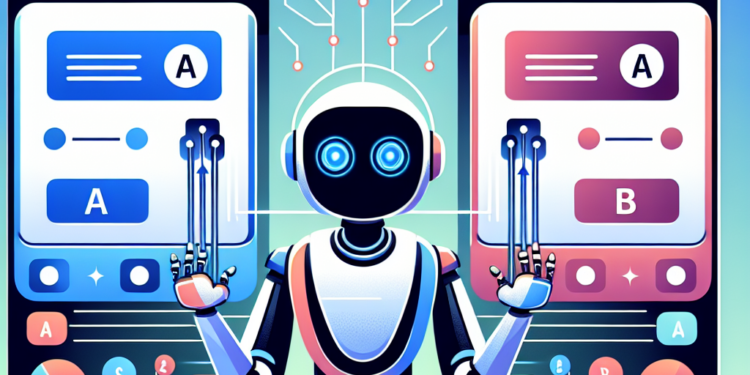AI Tricks for Effective A/B Testing
A/B testing is a vital process for businesses looking to optimize their websites, applications, and marketing campaigns. By testing two variations of a particular element and analyzing the results, companies can determine which version is more effective in achieving their desired goals. However, running A/B tests manually can be time-consuming and complex, which is where artificial intelligence (AI) comes in. AI can help streamline the A/B testing process, make it more efficient, and provide valuable insights that can help businesses make data-driven decisions. In this article, we will explore some AI tricks for effective A/B testing.
1. Automated Test Design
One of the most time-consuming aspects of A/B testing is designing the tests themselves. AI can help automate this process by generating hypotheses for tests based on data analysis and machine learning algorithms. AI can analyze user behavior, website or application performance, and other key metrics to identify potential areas for improvement and suggest test ideas. This can save businesses a significant amount of time and effort in coming up with test variations.
2. Predictive Analytics
AI can also be used for predictive analytics in A/B testing. By analyzing historical data and user behavior patterns, AI algorithms can predict which test variations are most likely to perform well and which ones are unlikely to produce significant results. This can help businesses prioritize their testing efforts and focus on the variations that have the highest potential for success.
3. Real-time Testing
AI can enable real-time A/B testing, allowing businesses to make rapid decisions and implement changes on the fly. By continuously monitoring test results and user behavior, AI algorithms can provide insights in real-time and help businesses adapt their strategies accordingly. This can be particularly useful for businesses with dynamic websites or applications that require frequent updates and optimizations.
4. Personalization
AI can help businesses personalize their A/B testing efforts by segmenting users based on various demographic, behavioral, and psychographic criteria. By targeting specific user groups with tailored test variations, businesses can improve the relevance and effectiveness of their tests. AI can analyze user data and preferences to create personalized test variations that are more likely to resonate with each user segment.
5. Multivariate Testing
While traditional A/B testing involves comparing two variations of a single element, multivariate testing allows businesses to test multiple elements simultaneously. AI can help businesses optimize their multivariate testing efforts by analyzing complex interactions between different elements and identifying the most effective combinations. This can help businesses uncover hidden insights and opportunities for optimization that may not be apparent with traditional A/B testing.
6. Dynamic Content Testing
AI can facilitate dynamic content testing, where test variations are personalized in real-time based on user behavior and preferences. By dynamically adjusting content based on user interactions, businesses can create more relevant and engaging experiences for their audiences. AI algorithms can analyze user data and predict which content variations are most likely to resonate with each user, allowing businesses to deliver highly personalized experiences.
7. Automated Insights
AI can provide automated insights from A/B testing results, helping businesses interpret the data and understand the implications of their tests. By analyzing test outcomes, user behavior, and other key metrics, AI algorithms can generate actionable recommendations and suggestions for optimization. This can save businesses time and effort in analyzing test results and help them make informed decisions based on data-driven insights.
8. Continuous Optimization
AI can enable continuous optimization in A/B testing by automatically adjusting test variations based on real-time data and user feedback. By continuously monitoring test results and user behavior, AI algorithms can optimize test variations on the fly and adapt to changing circumstances. This can help businesses maximize their testing efforts and achieve ongoing improvements in performance and conversion rates.
In conclusion, AI can significantly enhance the effectiveness of A/B testing by automating test design, providing predictive analytics, enabling real-time testing, personalizing test variations, optimizing multivariate testing, facilitating dynamic content testing, delivering automated insights, and enabling continuous optimization. By leveraging AI tricks for A/B testing, businesses can streamline their testing efforts, improve their decision-making processes, and achieve better results. AI has the potential to revolutionize the way businesses conduct A/B testing and unlock new opportunities for optimization and growth.













